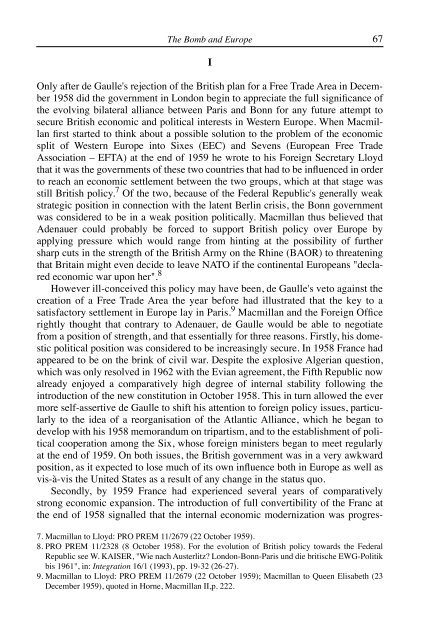number 1 - Centre d'études et de recherches européennes Robert ...
number 1 - Centre d'études et de recherches européennes Robert ...
number 1 - Centre d'études et de recherches européennes Robert ...
Create successful ePaper yourself
Turn your PDF publications into a flip-book with our unique Google optimized e-Paper software.
The Bomb and Europe 67<br />
I<br />
Only after <strong>de</strong> Gaulle's rejection of the British plan for a Free Tra<strong>de</strong> Area in December<br />
1958 did the government in London begin to appreciate the full significance of<br />
the evolving bilateral alliance b<strong>et</strong>ween Paris and Bonn for any future attempt to<br />
secure British economic and political interests in Western Europe. When Macmillan<br />
first started to think about a possible solution to the problem of the economic<br />
split of Western Europe into Sixes (EEC) and Sevens (European Free Tra<strong>de</strong><br />
Association – EFTA) at the end of 1959 he wrote to his Foreign Secr<strong>et</strong>ary Lloyd<br />
that it was the governments of these two countries that had to be influenced in or<strong>de</strong>r<br />
to reach an economic s<strong>et</strong>tlement b<strong>et</strong>ween the two groups, which at that stage was<br />
still British policy. 7 Of the two, because of the Fe<strong>de</strong>ral Republic's generally weak<br />
strategic position in connection with the latent Berlin crisis, the Bonn government<br />
was consi<strong>de</strong>red to be in a weak position politically. Macmillan thus believed that<br />
A<strong>de</strong>nauer could probably be forced to support British policy over Europe by<br />
applying pressure which would range from hinting at the possibility of further<br />
sharp cuts in the strength of the British Army on the Rhine (BAOR) to threatening<br />
that Britain might even <strong>de</strong>ci<strong>de</strong> to leave NATO if the continental Europeans "<strong>de</strong>clared<br />
economic war upon her". 8<br />
However ill-conceived this policy may have been, <strong>de</strong> Gaulle's v<strong>et</strong>o against the<br />
creation of a Free Tra<strong>de</strong> Area the year before had illustrated that the key to a<br />
satisfactory s<strong>et</strong>tlement in Europe lay in Paris. 9 Macmillan and the Foreign Office<br />
rightly thought that contrary to A<strong>de</strong>nauer, <strong>de</strong> Gaulle would be able to negotiate<br />
from a position of strength, and that essentially for three reasons. Firstly, his domestic<br />
political position was consi<strong>de</strong>red to be increasingly secure. In 1958 France had<br />
appeared to be on the brink of civil war. Despite the explosive Algerian question,<br />
which was only resolved in 1962 with the Evian agreement, the Fifth Republic now<br />
already enjoyed a comparatively high <strong>de</strong>gree of internal stability following the<br />
introduction of the new constitution in October 1958. This in turn allowed the ever<br />
more self-assertive <strong>de</strong> Gaulle to shift his attention to foreign policy issues, particularly<br />
to the i<strong>de</strong>a of a reorganisation of the Atlantic Alliance, which he began to<br />
<strong>de</strong>velop with his 1958 memorandum on tripartism, and to the establishment of political<br />
cooperation among the Six, whose foreign ministers began to me<strong>et</strong> regularly<br />
at the end of 1959. On both issues, the British government was in a very awkward<br />
position, as it expected to lose much of its own influence both in Europe as well as<br />
vis-à-vis the United States as a result of any change in the status quo.<br />
Secondly, by 1959 France had experienced several years of comparatively<br />
strong economic expansion. The introduction of full convertibility of the Franc at<br />
the end of 1958 signalled that the internal economic mo<strong>de</strong>rnization was progres-<br />
7. Macmillan to Lloyd: PRO PREM 11/2679 (22 October 1959).<br />
8. PRO PREM 11/2328 (8 October 1958). For the evolution of British policy towards the Fe<strong>de</strong>ral<br />
Republic see W. KAISER, "Wie nach Austerlitz? London-Bonn-Paris und die britische EWG-Politik<br />
bis 1961", in: Integration 16/1 (1993), pp. 19-32 (26-27).<br />
9. Macmillan to Lloyd: PRO PREM 11/2679 (22 October 1959); Macmillan to Queen Elisab<strong>et</strong>h (23<br />
December 1959), quoted in Horne, Macmillan II,p. 222.

















